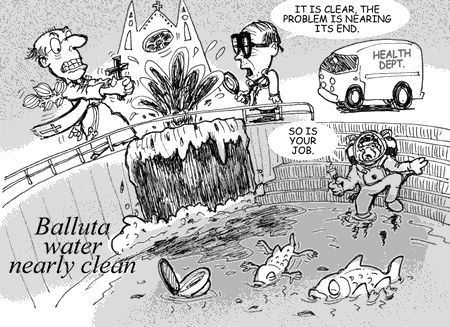The forthcoming general election is the first election to be contested since Malta became a member of the European Union. Although subject to the same electoral laws and overriding provisions of the Constitution, it is hoped that the four parties’ electoral teams and candidates, and most especially the electorate, will approach this election and cast their vote from the perspective of a European mindset.
Elections in Europe are generally, though not always, characterised by the electorate analysing the proposals of the parties, which are publicised at the beginning of the campaign. The electorate tends to vote dispassionately, beyond the tribal, parochial, blinkered drawing of battle lines we tend to experience over here. Choices are made according to past performances and future targets and the vision of the parties concerned.
Our first word of caution is against mudslinging. The local election campaign need not adopt a negative attitude characterised by personal attacks on both sides. In today’s European climate, a negative and personally-based campaign is often doomed to failure. Instead, the parties should tell us what they intend to do with the trust placed in their hands. We would also like to see that electoral manifestos are produced and released at the beginning of the campaign, to give the electorate ample time to analyse their promises and ideas. Early publication will also give the media ample time to cost the programmes concerned, and to launch full and open discussion about various electoral issues during prime time television and radio programmes. Hopefully, these discussions will revolve round the manifestos, and not just the personality of the party leaders. We appreciate that the campaign, like all previous ones, will take on a Presidential tone, but essentially it is the respective programmes that should take centre stage.
As opinion makers we, too, would like to present a concise list of proposals, which we would like to see included in the respective programmes of the four political parties.
National institutions need to enjoy the trust of the people. All appointments should be based on the value of meritocracy, and made after approval by specially set up parliamentary committees where the potential and interests of recommended person can be subject to discussion.
The President of Malta should be appointed by a two-thirds parliamentary vote.
A special constitutional provision be introduced specifically to protect outside development zones.
A commitment to revise the rent laws, both commercial and residential, with a view to ending the present injustice suffered by the owners of rent-bound properties.
The revisiting the 1992 church-state agreement with a view to its abolition, especially insofar as jurisdiction over marriage laws are concerned.
The granting of mutual rights and obligations to co-habitating partners.
The introduction of the right to remarry in cases where previous marriages have irredeemably broken down.
The gradual shifting of taxation from earnings to spending.
Stricter work ethics and performance from all public sector employees.
Concrete measures to provide incentives environment-friendly lifestyles, and for commercial companies to enhance their green credentials.
The abolition of summer half days for the public sector.
The revisiting of vehicle registration tax.
The abolition of travel taxes.
The introduction of pro-positive, as opposed to only abrogative, referendums.
Many of these measures will go a long way towards fulfilling many of the aspirations and dreams of the majority which voted enthusiastically for a new European beginning in our country in 2003. Modern democracies are no longer simply the dictatorship of the majority, but are fast moving towards the concept of a participatory democracy in which citizens feel they have a stake and can really influence decisions.
Essentially, the long and short of most of our proposals is to make all citizens feel they have a stake and ownership of the system: in others words, a truly inclusive society which gives space to all, irrespective of their individual political leanings. This will break the present mould, whereby half the population feels excluded and a very small minority feels disenfranchised altogether, since their votes are lost in system weighted heavily in favour of the two traditional parties.
Does a local Beppe Grillo need to materialise before we realise how excluded many people feel?
Quote of the week:
“Balluta water nearly clean”
– Headline used by The Times last Thursday in its report about the Balluta Bay drainage that has been infesting the area for years

